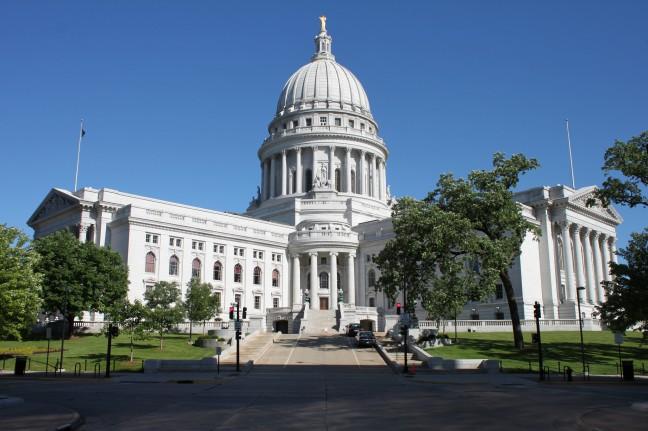In Feb. 2018, Gov. Scott Walker authorized Attorney General Brad Schimel to enter Wisconsin into a multi-state lawsuit to overturn the Affordable Care Act. Brad Woodhouse, the director of the Protect Our Care Campaign said the lawsuit “could take health insurance away from 416,600 Wisconsinites, raise premiums and end the Medicaid expansion, which has been critical for combating the opioid epidemic and keeping rural hospitals afloat.”
Given the GOP’s strong stance against the Affordable Care Act, the only chance Wisconsin would have had to leave the lawsuit depended on the possibility of electing a Democratic administration during the next election season.
In this constant era of overwhelming political polarization, an election — particularly one that results in the power being transferred from one party to another — should result in radical political change. When party platforms and party members look nothing alike, it only makes sense the resulting policies look different as well.
Nearly a year later, Scott Walker and Brad Schimel have lost their seats in Wisconsin state government. After a heated midterm election, key constitutional positions were flipped from Republican to Democrat. One would think the policy resulting from this switch would be quite different from where we were a year ago, but the first month of the Evers’ administration can best be described as a stalemate.
Balanced government begins with strong, accountable treasurer’s office
Both Gov. Evers and Attorney General Josh Kaul heavily campaigned on removing Wisconsin from the ACA lawsuit. Evers even used his first State of the State address to announce he had directed Kaul to do so. In any other state, this would be a common procedure, but in Wisconsin, it might not even be legal.
Though a month isn’t enough time to indicate the overall tone of an administration, it’s easy to say much of Evers’ tenure as governor will be characterized by the effects of December’s lame duck session. Before the session, law would have allowed Kaul to remove Wisconsin from the lawsuit with Evers’ approval. The new legislation, however, requires Kaul to get the approval of state budget committee, in which Republicans hold a 12-4 majority.
Republican leaders were quick to suggest Evers’ request of Kaul was illegal. So far, Kaul’s actions have been quite legal — Kaul sent his request to the state budget committee to remove Wisconsin from the lawsuit. Though Evers withdrew the authorization Jan. 22, the budget committee has signaled it intends to keep Wisconsin in the lawsuit. The chairs of the committee, Rep. John Nygren, R-Marinette, and Rep. Alberta Darling, R-River Hills, have continued to discuss the measure with their GOP colleagues, but their position is not likely to change.
‘You are the winter soldiers:’ hundreds gather at the Capitol to protest Wisconsin Republicans
Kaul’s catch-22 begs the question: Why would Evers have Kaul enter a fight he is designed to lose? Possible answers are abundant. Evers said, “We will obey the law as it exists but as a first step, I needed to inform the attorney general of my desire to get out of the lawsuit.” But given that both heavily campaigned on the issue, this seems a bit redundant. Evers spokesperson Melissa Baldauff said Evers “has simply withdrawn his authority for this lawsuit,” although lame duck legislation seems to do that for him.
But what really indicates the Democrat’s motivation for doing this is the numbers. A Marquette Law School poll reported 48 percent of registered voters believe Wisconsin should withdraw from the lawsuit seeking to dismantle the Affordable Care Act. Regardless of recent legislation, it’s the governor’s job to advocate on behalf of the people of the state. It appears Evers will do so, despite the opposition’s strong efforts to hold him back.
Since the power to remove Wisconsin from the lawsuit is out of the hands of the executive branch, Evers’ slight exhibition of civil disobedience is largely symbolic. Really, removing Wisconsin from the lawsuit is largely symbolic as well — 18 other states and the governor of Maine are also plaintiffs in the suit, so litigation will proceed regardless of Wisconsin’s role as a litigant.
Despite red tape, fight to end Wisconsin Economic Development Corporation is far from over
Despite all odds against the Evers administration and the lack of tangible change resulting from the effort itself, it is imperative for the Evers administration to keep fighting to represent Wisconsin as truly as possible. The payoff for removing Wisconsin from the ACA lawsuit may not be significant, but if anything, it shows the leaders we’ve elected truly have our best interests in mind.
“The people of Wisconsin voted for a change this November and asked us to stop playing politics with their health care,” Evers said. Whether or not Wisconsin “stops playing politics” remains to be seen, but the efforts to cease this game shows not everything in Wisconsin’s government is inherently broken.
Abigail Steinberg ([email protected]) is a sophomore majoring in political science and journalism.














